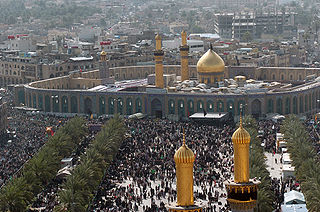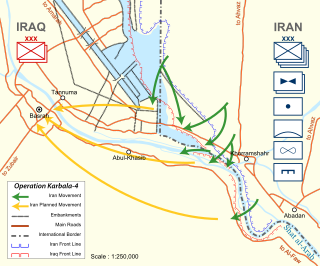
The Iraqi Republican Guard was a branch of the Iraqi military from 1969 to 2003, which existed primarily during the presidency of Saddam Hussein. It later became known as the Republican Guard Corps, and then the Republican Guard Forces Command (RGFC) with its expansion into two corps. The Republican Guard was disbanded in 2003 after the invasion of Iraq by a U.S.-led international coalition.

Karbala or Kerbala is a city in central Iraq, located about 100 km (62 mi) southwest of Baghdad, and a few miles east of Lake Milh, also known as Razzaza Lake. Karbala is the capital of Karbala Governorate, and has an estimated population of 711,530 people (2018).

The Battle of Karbala was fought on 10 October 680 between the army of the second Umayyad caliph Yazid I and a small army led by Husayn ibn Ali, the grandson of the Islamic prophet Muhammad, at Karbala, Sawad.
Events in the year 2004 in Iraq.

The Mahdi Army was an Iraqi Shia militia created by Muqtada al-Sadr in June 2003 and disbanded in 2008.

In Shia Islam, Arba'in marks forty days after Ashura, which is the death anniversary of Husayn ibn Ali, grandson of the Islamic prophet Muhammad and the third Shia imam. Husayn was killed, alongside most of his relatives and his small retinue, in the Battle of Karbala on 10 Muharram 61 AH against the army of the Umayyad caliph Yazid ibn Mu'awiya. The battle followed Husayn's refusal to pledge his allegiance to Yazid, who is often portrayed by Muslim historians as impious and immoral. In Shia Islam, Karbala symbolizes the eternal struggle between good and evil, the pinnacle of self-sacrifice, and the ultimate sabotage of Muhammad's prophetic mission.

The Badr Organization, previously known as the Badr Brigades or Badr Corps, is an Iraqi Shia Islamist political party and paramilitary organization headed by Hadi Al-Amiri. The Badr Brigade was the Iran-officered military wing of the Iran-based Shia Islamic party, Supreme Council for Islamic Revolution in Iraq (SCIRI), formed in 1982. The Badr Brigade was created by Iranian intelligence and Shia cleric Mohammad Baqir al-Hakim with the aim of fighting Saddam Hussein's regime during the Iran–Iraq War. Since the 2003 US-led invasion of Iraq most of Badr's fighters have entered the new Iraqi army and police force. Politically, Badr Brigade and SCIRI were considered to be one party since 2003, but have now unofficially separated with the Badr Organization now an official Iraqi political party. Badr Brigade forces, and their Iranian commanders, have come to prominence in 2014 fighting the Islamic State of Iraq and the Levant (ISIL) in Iraq. It is a part of the Popular Mobilization Forces.

The 2004 Iraq spring fighting was a series of operational offensives and various major engagements during the Iraq War. It was a turning point in the war; the Spring Fighting marked the entrance into the conflict of militias and religiously based militant Iraqi groups, such as the Shi'a Mahdi Army.
The Karbala provincial headquarters raid was a special operation carried out on January 20, 2007, by The Asa'ib Ahl al-Haq, on the U.S. contingent of the Joint Security Station located within the Iraqi Police headquarters. The assault, which left five U.S. soldiers dead and three wounded, has been called the "boldest and most sophisticated attack in four years of warfare" and is furthermore notable for being one of the few instances when any sort of militants or insurgents have actually managed to capture U.S. soldiers since the Vietnam War.

Operation Karbala-4 was an Iranian offensive in the Iran–Iraq War on the southern front. The operation was launched after the failure of Operation Karbala-2 and Operation Karbala-3 to move the Iraqi lines in an effort to capture Iraqi territory.
The Battle of Karbala began on the night of 27 August 2007 and involved fighting between the Mahdi Army, who provided security for the pilgrims, and police in Karbala, Iraq.
The Battle of Karbala was a battle which was fought during the 1991 uprisings in Iraq which followed the Gulf War. The battle started after demoralized troops throughout Iraq began to rebel against Saddam Hussein. From 5 to 19 March 1991, the city of Karbala became a chaotic battlefield as the result of bitter fighting between the insurgents and the Iraqi Republican Guard. After the failure of the uprising, citizens were killed in large numbers. Parts of the city were nearly leveled.

The Battle of the Karbala Gap occurred during the 2003 invasion of Iraq. The Karbala Gap is a 20–25-mile wide strip of land with the Euphrates River to the east and Lake Razazah to the west. This strip of land was recognized by Iraqi commanders as a key approach to Baghdad, and was defended by the Medina and Bakhtnisar Divisions of the Iraqi Republican Guard. American forces attacked Iraqi forces in the area with massive air attacks followed by concentrated armored thrusts which resulted in the Iraqi units being surrounded and annihilated.

The Battle of Karbala took place during the 2003 invasion of Iraq as U.S. troops fought to take control of the city from Iraqi forces. The city had been bypassed during the advance on Baghdad, leaving American units to clear it in two days of street fighting against Iraqi irregular forces.
ʿAbbes is an old Arabic name that means "Lion". The name traces back to Al-‘Abbas ibn ‘Abd al-Muttalib in 536 CE and Abbas ibn Ali, a son of Ali ibn Abi Talib, who participated in the battle of Karbala alongside his brother Husayn ibn Ali. Abbas ibn Ali is revered by Muslims, some of whom are named Abbas in remembrance and tribute to him. There is an Arabian tribe of the same name, the Banu Abbas.

The 2003 attack on Karbala was an unsuccessful strike on the Iraqi Republican Guard's Medina Division by the U.S. 3rd Infantry Division during the 2003 invasion of Iraq. The Medina Division was mostly deployed along the Karbala gap, west of the city of Karbala itself. The Iraqi Division was targeted as it was the best equipped Iraqi unit, and its destruction would negatively affect Iraqi military morale. The Medina Division sustained only limited damage during the engagement.

The siege of Basra, code-named Operation Karbala-5 or The Great Harvest, was an offensive operation carried out by Iran in an effort to capture the Iraqi port city of Basra in early 1987. This battle, known for its extensive casualties and ferocious conditions, was the biggest battle of the war and proved to be the last major Iranian offensive. The Iranians failed to reach their objective.

The Arba'in pilgrimage is the world's largest annual public gathering. It is a pilgrimage to the shrine of Husayn ibn Ali, grandson of the Islamic prophet Muhammad and the third Shia imam. Every year, on the twentieth of Safar, also known as Arba'in, millions of pilgrims flock to Karbala, Iraq, often arriving there on foot from the nearby city of Najaf. Arba'in marks forty days after the tenth of Muharram, known as Ashura. On this day in 61 AH, Husayn was killed, alongside most of his relatives and his small retinue, in the Battle of Karbala against the army of the Umayyad caliph Yazid ibn Mu'awiya. The battle followed Husayn's refusal to pledge his allegiance to Yazid, who is often portrayed by Muslim historians as impious and immoral. In Shia Islam, Karbala symbolizes the eternal struggle between good and evil, the pinnacle of self-sacrifice, and the ultimate sabotage of Muhammad's prophetic mission.

The 'Al-Medina' Armored Division was an elite formation of the Iraqi Republican Guard.
Operation Karbala 3, also known as the Battle of Al-Ummiyah, was an operation during Iran–Iraq War, which was launched by Iran from 30 August to 2 September 1986 with the operation code of "Hasbonallah wa Ne'mal Wakil ".












